
Newsroom
Dancing with the Whales
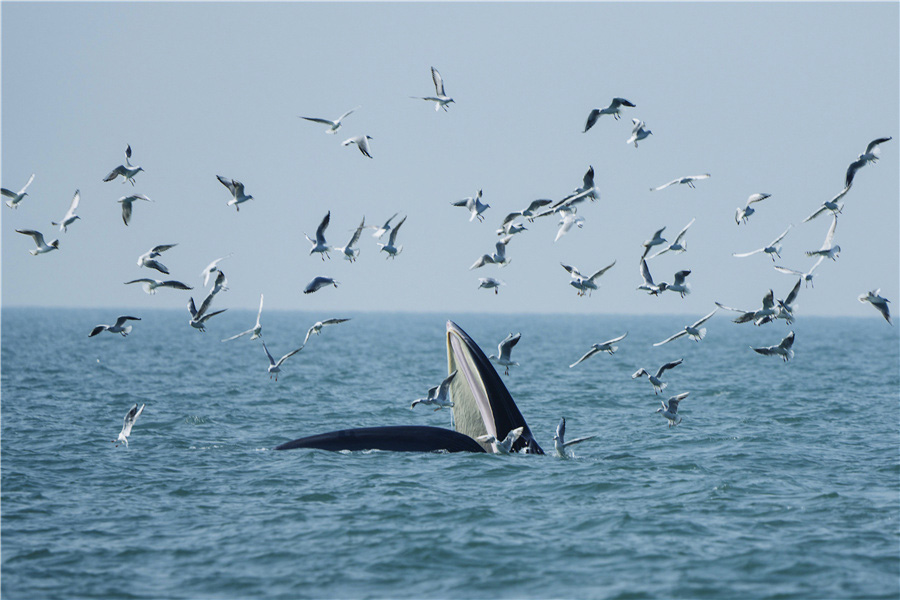
Bryde's whales hunt in open water not far from the scientific research ship, attracting seabirds to join. [Photo/Xinhua]
In waters off Weizhou Island, Beihai, in South China's Guangxi Zhuang autonomous region, a group of experts have become acquainted with the whales.
They use small boats every day to track and record the traces of the Bryde's whale. Composed by scientists, videographers, fishermen and volunteers from Guangxi Academy of Sciences, Institute of Hydrobiology at Chinese Academy of Sciences and Beibu Gulf University, the Beibu Gulf marine mammal joint research group has been conducting research on the whales and taking the role of the guardians of these marine mammals since they were first discovered in waters off Weizhou Island in 2016.
The Bryde's whale, mainly seen in tropical and subtropical waters, is regarded as a very mysterious species of cetaceans, with a body length of 10 to 12 meters and a weight of up to 15 tons. Related research is very limited worldwide with regard to this rare species. The frequent appearance of the Bryde's whale makes Weizhou Island the only large-scale cetacean predation spot discovered in China's coastal waters since the 1980s.
The captain of the joint research group Yang Chengteng, who returned to his hometown to start his own business, was the first to discover the Bryde's whale near Weizhou Island In 2016.He immediately informed Chen Mo, an associate researcher of Guangxi Academy of Sciences. Since then, Yang invited many local fishermen into their WeChat group, and kept the scientific research team informed of the traces of the Bryde's whale.
Chen, together with recently joined cetacean conservation biology graduate students Wang Ruilong and Zhang Yaoyao of the Institute of Hydrobiology at the Chinese Academy of Sciences, hopes to learn about Bryde's whale as much as possible through research methods such as individual identification, behavior recording, health assessment and marine environmental monitoring.
Their ultimate goal is to protect the marine ecology with substantial scientific basis. Xu Jian and Wu Lixin, two veteran nature documentary photographers, will take advantage of their beautiful lenses to help more people understand and love the magical cetaceans in the Chinese waters. Xu Zhaoyuan, a student from Harbin Medical University, sacrifices his precious vacation time to volunteer for the scientific expedition team.
Day after day on the sea, the guardians marvel at the magic of creation for countless times, but few would know and feel deeply that their work is hard-earned. Yang Chengteng is at the helm of the joint research group during the scientific expedition, yet he has to worry about his livelihood for the rest of the year. Researchers are tight on funds and carefully plan every cent of their expenses, but they still work tirelessly and insist on long-term offshore operations every day.
Documentary photographers have to steadily manage various shooting equipment in a small boat, and strive for every precious moment without disturbing the whales. For young volunteers, seasickness has become the biggest torment due to the turbulent sea.
In order to protect the Bryde's whale, the local government promulgated the Regulations on Ecological Environment Protection of Weizhou Island in Beihai City in 2018, stipulating that fishing within 6 kilometers of the outlying island is prohibited. At the same time, the fishery administration has stepped up patrols, and people from all walks of life have also called on the public not to engage in whale watching until the condition of the Bryde's whale has been thoroughly and scientifically assessed.
But Chen Mo still has some concerns over the future of the Bryde's whale. Some human activities pose great threats to their survival: tourists take legal fishing boats to watch whales privately in the name of fishing; many fishing boats cruise at night near the forbidden waters, and fishermen use bright light to trap the whale's main fish prey; the increasingly prosperous island tourism has caused the water quality of the surrounding sea to deteriorate.
Faced with these situations, the guardians have worked closely with the government to promote popular science to local fishermen, students and tourists. A marine education textbook is also being prepared. Efforts are being made by the government and the guardians to protect the Bryde's whale while serving the interests of the local people. (China Daily)
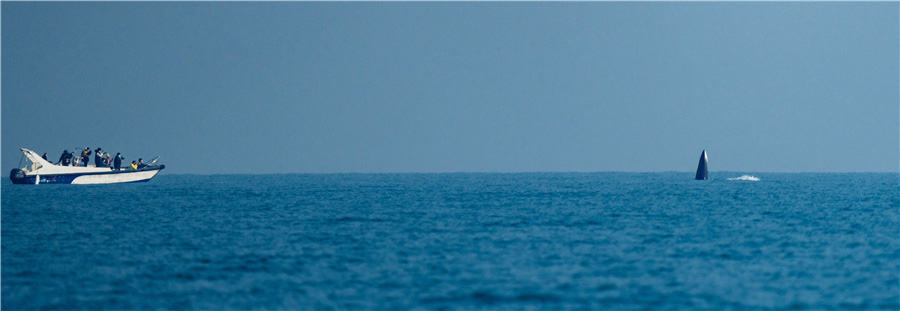
Bryde's whales hunt in open water not far from the scientific research ship, attracting seabirds to join. [Photo/Xinhua]
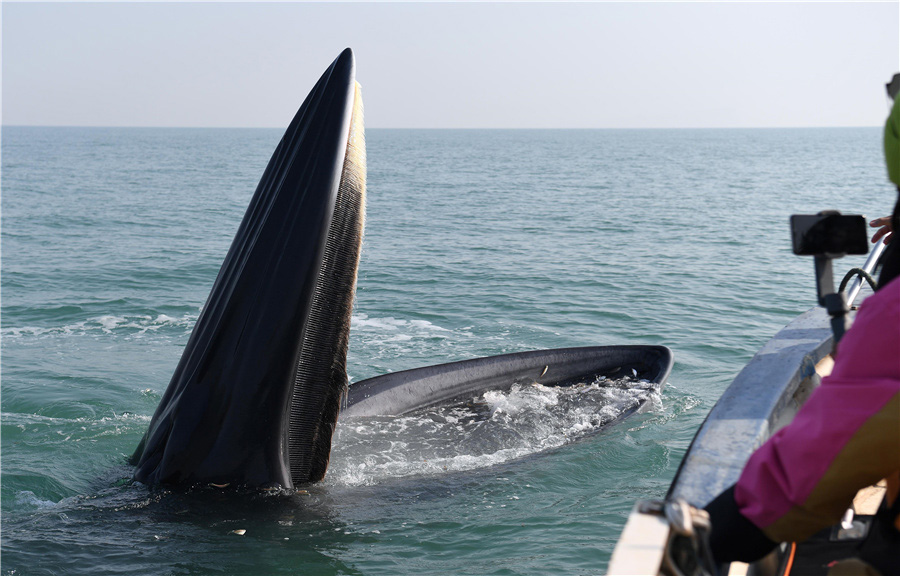
A Bryde's whale approaches the scientific research ship during predation. Bryde's whales are rarely caught hunting near the ship. The team shuts down their motors. [Photo/Xinhua]
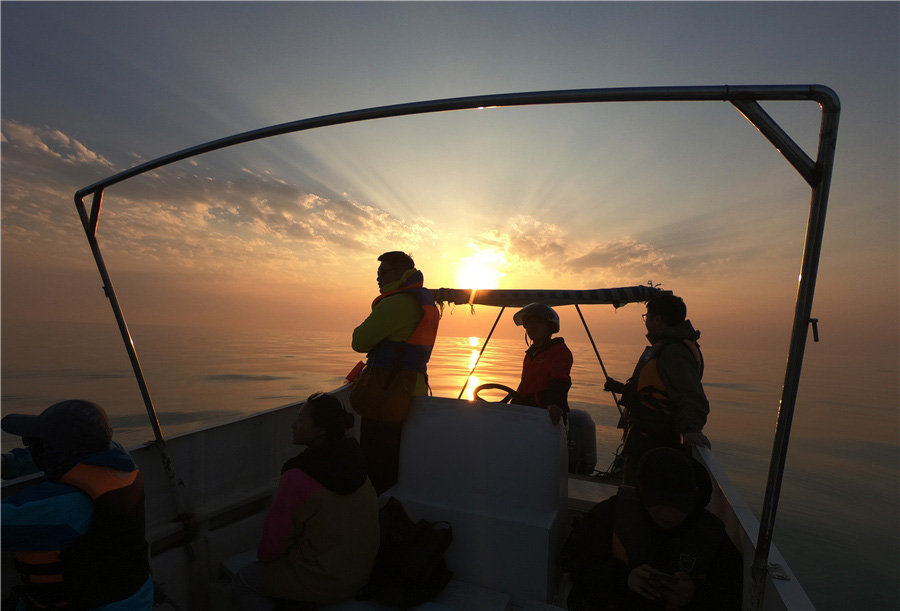
Chen Mo (first from left) and Yang Chengteng (second from left) look into the distance in the sunset, after leaving Xieyang Island. [Photo/Xinhua]

Chen Mo communicates in a science lecture with pupils from Peiwen Primary School in Laibin city, Guangxi. [Photo/Xinhua]
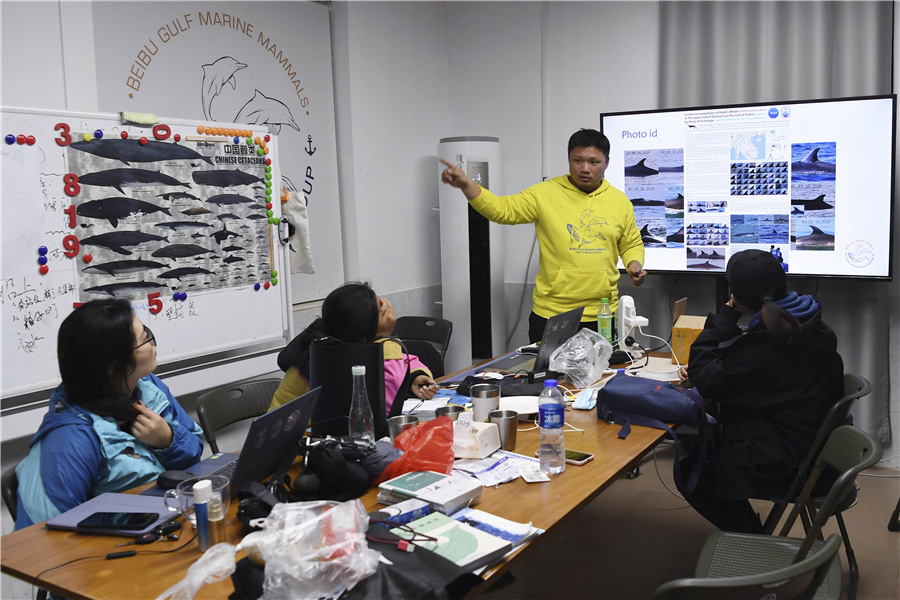
Chen Mo shows Zhang Yaoyao (first from left), Wang Ruilong (first from right) and others the photos of the dorsal fin used for identifying the Bryde's whale. [Photo/Xinhua]

Xu Jian cooks for the scientific expedition team on Xieyang Island. [Photo/Xinhua]
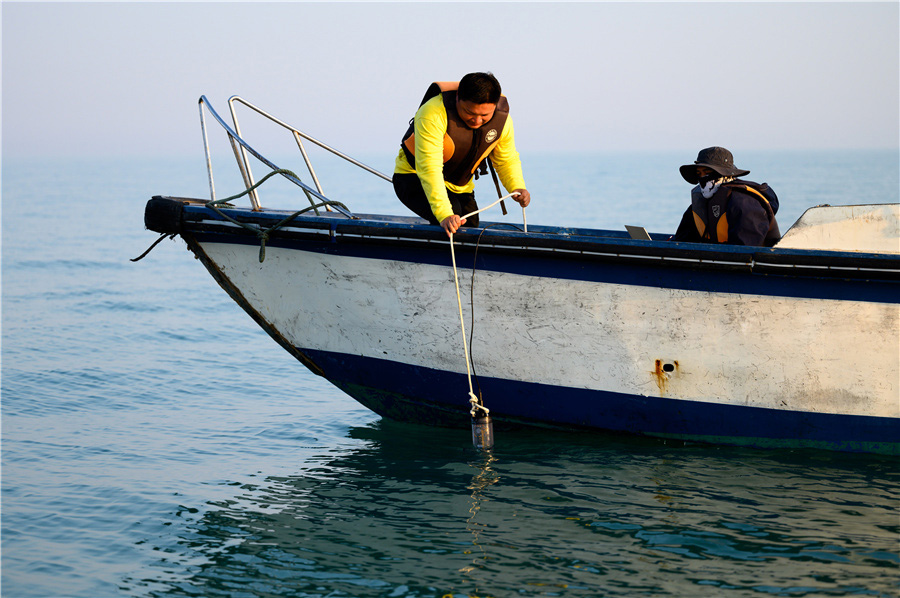
Chen Mo puts the water quality analyzer into the water. [Photo/Xinhua]